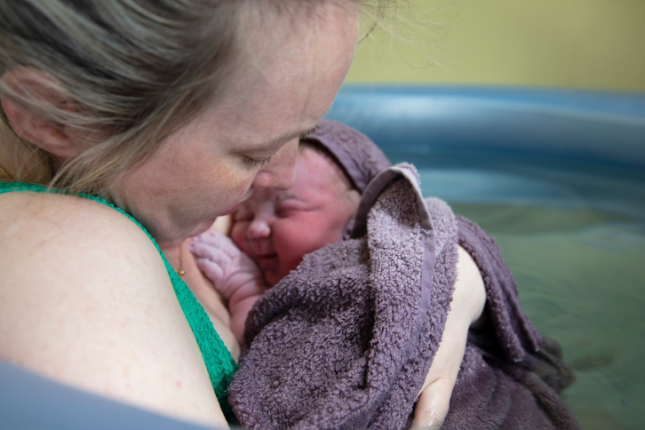Emily Mason 0:01
Thinking about your labor and delivery can be overwhelming. If you are among the women who are interested in birthing out of hospitals and at a birth center, then this podcast is for you. Today. We are chatting about birth center options for labor and birth and what you need to know before you give birth. Thanks for joining us. This is preggie pals.
Emily Mason 0:54
Welcome to preggie pals. My name is Emily Mason, and I'll be your host today. If you haven't already, be sure to visit our website at New mommy media.com and subscribe to our weekly newsletter, which keeps you updated on all the episodes we release each week. Another great way to stay updated is to hit that subscribe button in your podcast app. And if you're looking for a way to get even more involved with our show, then check out our online community. It's called Mighty moms. That's where we chat more about the topics discussed here on our show, and it's also an easy way to learn about our recording so you can join us live. Our guest today is Nancy Myrick. Nancy is a certified nurse midwife and has been the director of San Francisco birth center since 2015 before that, she practiced home birth midwifery from 2003 to 2016 with rites of passage midwifery Nancy began attending births as a doula. In 1993 she received her RN in 2000 and completed her training in midwifery in 2003 through the UCSF nurse midwifery education program, she has attended hundreds of births in homes, birth centers and hospitals, and believes that choice in childbirth helps parents begin that long path toward building great humans. Nancy, thank you so much for joining us. Will you please tell us a little bit more about yourself and your family?
Nancy Myrick 2:24
Sure, I live in San Francisco and have lived here very long time, since the 80s. I'm married to a wonderful man and have a beautiful 27 year old daughter now.
Emily Mason 2:36
Wow. That is fantastic. We also have a mama joining us today, Jean lie. She gave birth in a San Francisco birth center to her daughter Andy, on February 18 of this year, and she is a first time parent. Welcome Jean. Thank you all for being here, and we are going to dive into today's topic, but first, let's take a quick break.
Today we're trying to answer some common questions pregnant mamas might have about birthing at a birthing center. So Nancy, these next couple of questions are for you to kind of help us demystify some of these questions we may have the first one, an easy one, but what is a birth center?
Nancy Myrick 3:28
Well, I'm so glad you asked, because it can be very confusing. The Birth Center, in our case, we are a free standing birth center. That means that we're not a part or attached to a hospital. We have two birthing suites where people can give birth. It is distinguished from a hospital labor and delivery and I say that because some hospitals call their labor and delivery units birth centers, which makes it very confusing, but they are different in that they are sort of designed for higher risk birth. They have obstetrician surgeons on standby and anesthesiologists and big pediatric teams and then NICU, and they're really designed for those complications that may come up in pregnancy. We are really designed for normal birth, so healthy pregnant people giving birth at term and wanting to have a more comfortable, friendly, warm, almost home, like environment for their births.
Emily Mason 4:32
Okay, that sounds really peaceful.
Nancy Myrick 4:36
It is peaceful. It's really sweet. When folks walk in the door to our birth center, they kind of give us this like reaction where they're like this is so welcoming and warm and friendly here, which is not the way it sometimes feels in a big, busy hospital, right,
Emily Mason 4:54
right? So how does one find that birth center? Or that relaxation, where do I? Where do we go to look?
Nancy Myrick 5:03
There are a couple of ways. Good old Google often does the trick. If you just Google birth center in your area, you might find one. Sometimes you get routed to those hospital you know, quote, unquote, birth centers. But you can also check out the American Association of birth centers. Website, they list birth centers all over the country. That's another great place to look. So
Emily Mason 5:27
can anyone give birth at a birth center if they're pregnant with twins or high risk or gestational diabetes? Yeah,
Nancy Myrick 5:36
it really depends upon the situation. You know, we our specialty, like I said, is healthy pregnant people. And how you define health can be a little complex, but in general, just one baby in your uterus, head down at the end. No. In California, we have some pretty specific regulations, so no history of uterine surgery, so unfortunately, we can't care for pregnant people who have had a C section with a prior birth. You know, one of the questions we get a lot is, oh, I'm 39 years old. I'm advanced maternal age. The dreaded AMA. That's not a problem for us at all. While there are you as an older pregnant person can have increased risk for certain complications. They're really things that we're we're following with everybody but everyone, and we feel quite comfortable taking care of older parents. Group B strep positive, not a problem at all. We can give antibiotics and when it comes to gestational diabetes, it's we can care for people who are able to manage it through diet and exercise. If it gets to the point where you need medication, we refer you for
Emily Mason 6:51
a hospital birth. So on the topic of medication, can you get pain medication for labor if you give birth at a birthing center? Yeah.
Nancy Myrick 7:00
Well, the short answer is no, we're really designed for natural childbirth. There are a couple of things we do offer that can really help out. Though we do have nitrous so kind of a medication, kind of not but for a lot of people, it can really take the edge off of the pain of labor. And for many folks, they really appreciate that extra support. We don't have epidurals. We don't have narcotics. The other thing we have, though are our big, deep birthing tubs, and most of our folks spend at least some time of their labor in the birthing tub. And it can really help. There's good research to show that when people get into really immerse themselves in warm water, their perception of the feeling of those contractions really diminishes. That's an awesome support for people in labor.
Speaker 1 7:55
So C sections, things, complications arise. What? What about C sections or transfer rates? What do those look like at a birthing center? Yeah,
Nancy Myrick 8:06
so we actually have a pretty low C section rate, and obviously we don't do C sections here at the birth center. What we do here is normal, healthy birth. And yet, of course, sometimes complications do arise, and it is pretty rare for those complications to be emergencies. If something is coming up, our job as a midwife is to determine what's appropriate for the birth center and what we should go to the hospital for and for the people who come in labor, maybe about one in five folks end up at the hospital. Typically, that's not an emergency. Typically, that is somebody's blood pressure is rising, or there's meconium in the amniotic fluid, or it's just a long, slow, exhausting labor, and we talk about some of the tools that they have at the hospital that can help you get the baby out. Always, of course, our bottom line is a healthy baby and a healthy mom. Those are our goals. And if that's best served at the hospital, we go. I think our C section rate these days is about 10 or 11% which is about a third of the national average for C sections.
Emily Mason 9:19
So you've talked about some of the perks. But can you elaborate on more perks to birthing at a birth center?
Nancy Myrick 9:26
Sure. I mean, I think perks is a is a funny word, but it's really such a blessing to be able to give birth in this spacious, relaxing environment. I think a really popular thing that we have here are our big, deep birthing tubs. There's lots of people who come to the birth center and get straight into our tubs and spend much of their labor there. And many of our folks actually give birth in the tub, which is really sweet. We have yoga balls. And birth stools and a double bed so you and the family can snuggle up together after the birth and the yoga swing, and there's just lots of things there to support you in your natural childbirth. But honestly, I think one of the best things about the birth center is the team that takes care of you, or a small team of midwives that you get to know intimately, and it's so nice to be cared for by somebody familiar. Yeah,
Emily Mason 10:27
and that really plays into my next question. You talked about the team and that, you know, snuggling up after giving birth. But can you tell us a little bit more about that relationship based care and what that looks like in birth centers. Relationship
Nancy Myrick 10:45
based care is really one of the most important things that we bring to folks at the birth center. We really think it's important that you have people that you know caring for you in this very vulnerable time. We spend a lot of time with our clients. We most of our visits are an hour long. We have an opportunity to really dig deep with people and learn who they are and have them learn who we are. And this is so beneficial during birth, when you're feeling particularly vulnerable. Yeah, absolutely
Emily Mason 11:20
that. I'm excited to explore more into that, but first we're going to take a quick break, and we have some more birth center questions coming up.
Welcome back to preggy pals. We are continuing our topic on birth centers and relationship based care, and just following up from before the break, how important is that trust that you have with the birth team?
Nancy Myrick 11:53
Well, I think it's super important, and I'd love to hear what Jean says about this. But for me as a midwife, I love the relationship that we develop with our clients that come here in birth when someone arrives at the birth center, we meet them at the door, we bring them up, we are right there, and it's like, hey, it's so nice to see you. I saw them last week. I saw them the week before we know that fear has a lot to do with birth not going smoothly, that fear causes tension, which causes more pain, there is this metaphor of DOE, a deer in labor in the woods, and If a lion comes by her labor shuts down because she knows that it's not safe to give birth. I kind of feel like that can happen when people go to the hospital, when you have strangers at your birth, it creates a environment of tension and fear, and it's hard to get away from that. Whenever there's a stranger, it is really hard to let loose and be vulnerable, and by having this team that you trust, it feels more like extended family and friends caring for you. That's our goal.
Emily Mason 13:13
Yeah, that that does sound good. Gene. I'd love to hear your thoughts on the importance of the team and trust?
Jean Lai 13:21
Yeah, I would say I completely agree with everything Nancy said, and that's one of the primary reasons I chose the birth center I at first. I actually did go to a traditional OB GYN from my very first appointment, and I feel like in that setting, you're in a room, you see a nurse. Eventually, you know, you wait by yourself. The doctor comes in, they see you for five minutes, and then they run away, whereas all of our birth center appointments were much longer. And I really did feel like I got to know each midwife versus, you know, the many doctors that could be at your birth in a hospital. So that was really important to me, and knowing that the midwives were also spending a lot of time with us at the birth center during our, you know, prenatal group classes in the actual birthing rooms, which was really nice to also just be able to, you know, even the room that you give birth in is is part of your birth team, and is a space that you want to feel comfortable in and trusting of. So we were able to have some of our classes in there, and that really helped me feel comfortable in the that whole setting,
Emily Mason 14:44
right, right? And so, when should a pregnant mama start looking at a birth center, you mentioned classes? So when she gets pregnant six months, what's, what's kind of the sweet spot? Spot?
Nancy Myrick 15:00
Well, the sweet spot is, soon as you get pregnant, we get often. We're the second person to learn about a pregnancy, especially for our clients that are repeat clients, we like to get started right at the very beginning. We can do a confirmation of pregnancy visit, and that gives us the full pregnancy to get to know you and to spend our time with education. Another important aspect of our care is what we call it's a big, fancy phrase, but collaborative decision making, and it really means that we're not telling the pregnant people what to do, but we are sitting down, spending time together, doing a lot of education, and as a team, coming up with a plan for their birth. That means that if we get to start working with people right at the beginning of pregnancy, we have lots of time to do that. So yeah, we have folks that come in much later as well, that come in at 30 or 32 weeks, and that's fine. We just have a lot of catch up to do in those in those weeks between when you arrive and when you give birth.
Emily Mason 15:59
Gotcha. So are birth centers covered by insurance? Or how does that work?
Nancy Myrick 16:06
It's dependent upon the birth center. We are in network with some plans and not in network with others, but we are able to bill insurance to pretty much all of the major plans. So it is covered.
Emily Mason 16:18
Very good, very good. And you mentioned repeat moms. But do you traditionally see a lot of first time moms or the second, third, fourth time moms? Well,
Nancy Myrick 16:29
all of it to be honest. You know, we live in San Francisco, where people don't tend to have five or six babies. It's hard to raise that many kids here, so we have a lot of first timers, and certainly a big group of second and third timers as well. We've
Emily Mason 16:44
got some more birth center questions coming up, but first, let's take a quick break.
Welcome back to preggy pals. We are continuing our topic on birth centers and relationship based care. And we have our mama, Jean here with us. And so Jean, what kind of advice for pregnant moms who are looking to give birth at a birth center, do you have
Jean Lai 17:22
the most important thing to me was the meeting the providers and seeing who would be caring for me and my baby and my family. When I met Nancy and knew that she would be the one most likely who would be on call and at the birth. That was really important to me, versus here in the hospital where it's just whoever's on call that might be attending your birth. So I think meeting the providers as that would potentially be at your birth is very important for me also understanding a little bit what the curriculum was that the birth center offers in a group prenatal and then seeing how much time they spend with you at your appointments, what the transfer rates are. Those were some other things that I was most interested in, and also knowing what the different options were for pain management and in the actual birth itself,
Emily Mason 18:36
what are some questions that a mom could have going in that you either asked yourself or wished you would have asked before walking into a birth center.
Jean Lai 18:50
I think transfer rates and just the whole all the things that are included in the care at a birth center. I think it probably varies for ours. I mentioned they include group prenatal classes. Nancy mentioned the postpartum visits, and she even hosts a new parent group for people after they give birth, which I've really been enjoying as well. And then some of the things that I was asking about were certain, you know, potential risk factors based on my own health history. You know, as a new mom, I didn't know if certain things would be considered risky or not. And then, you know, Nancy was able to refer me to other doctors that could help assess that. Another thing I really wish I knew before was hearing some birth stories from the birth center. I think that helps build some confidence in what you're. Trying to do, and also what you can expect. Okay,
Emily Mason 20:03
yeah, and so I think maybe to kind of summarize all of that going in, with an open mind, asking questions, making sure that you feel confident in where you're choosing to give birth. Nancy, do you have any other kind of interview questions that you have either come across or like when people ask,
Nancy Myrick 20:30
yes, I think that there are two important factors when you're considering giving birth at a birth center. And the first is, what, what is the structure of the care and the experience of the providers? And then the second piece is, really just, how does it feel to you? I go back to that birth is an intimate event that I was talking about before, and you want people caring for you that you can be vulnerable with. So yes, know that they have, you know, experience and training and that they have plans for emergencies and all of that is really important. But really look into your heart and say, Is this the team? Is this the person that I feel good about doing, having this extraordinary experience with, I guess I would add just what is the full package and something gene was just saying was it's not just about the birth. Prenatal Care is incredibly important. We have group prenatals, eight group prenatals, where we teach folks about certainly pregnancy and labor and birth, but also the postpartum and breastfeeding and baby care. It's really important for us that our folks are really educated and ready for the big event. And like I mentioned, we do postpartum home visits and postpartum visits back at the birth center, and like Jean said, we have this amazing new parents group where people sit around the circle and learn from each other and and that is, I think, an important thing to think about, like you don't get that kind of experience at a typical obstetrical practice,
Emily Mason 22:15
right? Right? So before we leave today and take this information and start doing some more research. We'd love to hear from Jean and hear her birth story and what that was like. Yeah, thanks,
Jean Lai 22:31
Emily. I want to preface this and say that this is probably not the most normal first time birth story, but it was an overwhelmingly positive experience. I went to 41 weeks, and at 41 weeks at the birth center, we would get scheduled for some additional testing, so we had that scheduled on the Sunday, but that morning, at around 3am I started feeling some cramps. And I hadn't felt any sort of cramping or Braxton Hicks or anything before, so I kind of knew that something was probably happening. I felt cramps for about two hours, and I let my partner, I told him I was cramping. Would I let him sleep? Because it wasn't that intense yet, and then around five or 6am it would it was more than a cramp. And so I woke up, told my partner, wake up, took a shower, washed my hair, knowing that I wouldn't be able to do that for a while. And then we called Nancy around that time to tell her that it had started, and started timing the contractions, and mostly was just labored at home in the bathroom for me, was kind of my safe space, and then also in the bed, in like a propped up Child's Pose position. Since I hadn't slept since 3am I was able to kind of rest in between contractions when I was in the bed, and then I labored at home for about six hours, so until noon, and we were checking in with our midwives every two ish hours. And when we were on the phone for that last time, when the contractions had finally, you know, gotten to approximately four minutes apart, I had a distinct feeling of a popping sensation, and I felt baby descend, basically, and I felt that strong urge to push. So we were on the phone, and Nancy confirmed we should head over to the birth center at that time and took us. Just a few minutes to pack up and get in the car. My dad had actually been staying with us that weekend, so he was able to drive us while my husband was in the back and could help provide counter pressure during the contractions, which he had been doing for the past six hours. As soon as I got in the car, my water broke, luckily, I had a blanket I was sitting on. And then we got to the birth center, and Nancy met us in the garage, and when she saw me, and you know, I attempted to walk up towards the birth center, she was like, Oh, you've been pushing already, haven't you? And I said, I guess I had been. And then we got up into the birthing suite. So between the time we arrived and up to the birthing suite, that probably took five minutes, just because I couldn't really walk during the contractions. And she had asked if I could lay down and if she could check me. And I said I couldn't lay down right now because there was too much pressure. So she asked me to lean forward and just lean on the bed. And I leaned forward, and she said, Oh, there's the head. And then she asked me to climb on the bed on all fours, which I was able to do. And then she asked my partner, Chris, if he wanted to catch a baby. And he said, Okay. So he went to go wash his hands, and as soon as he turned around, there was a big splash, and baby just came out and started crying. And he turned back, and Nancy had caught the baby and gave him the baby. And so it was just really fast and unexpected and really amazing experience.
Nancy Myrick 26:53
It was amazing. Gene was so powerful
Emily Mason 26:56
that is fantastic. Well, Nancy, now, I think everybody just wants to know the listeners, where they can find more information about you and your birth center, just to learn more. This has been so incredible.
Nancy Myrick 27:10
Well, sure our website, if you want to check us out, is sfbirthcenter.com get lots of information there. We have monthly info sessions that you can join where I share a lot more details about the kind of care we offer. And you can also just give us a call and we'll chat with you and and let you know answer any questions you
Emily Mason 27:31
have. Awesome. Thank you so much, and thank you so much to both of our guests who joined us for this episode today. Be sure to check out new mommy media.com where we have all of our podcast episodes, plus videos and more.
That wraps up our show for today. Thanks for listening. If you love Craigie pals as much as we do, please consider checking out the amazing businesses that sponsor our show week after week. And we'd also love to tell enough for you to tell another pregnant mama about this resource, which, of course, is absolutely free. And if you want to check out some of the other podcasts we produce, such as newbies parent savers, the boob group and twin talks, then visit our website at New mommy media.com thanks for listening to preggy pals your pregnancy your way.
Disclaimer 28:32
This has been a new mommy media production. The information and material contained in this episode are presented for educational purposes only. Statements and opinions expressed in this episode are not necessarily those of new mommy media and should not be considered facts. While such information and materials are believed to be accurate, it is not intended to replace or substitute for professional medical advice or care and should not be used for diagnosing or treating healthcare problem or disease or prescribing any medication. If you have questions or concerns regarding your physical or mental health or the health of your baby, please seek assistance from a qualified healthcare provider you.








